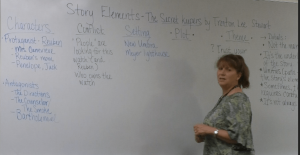Southeast Ohio schools navigate a nationwide shortage of teachers
By: Jack Demmler
Posted on:
ATHENS, Ohio (WOUB) – Athens City Schools are fully staffed on all teacher positions for the upcoming school year, but getting there was not easy.
“This has been the most difficult summer we’ve ever had in regards to filling all the positions,” Superintendent Tom Gibbs said.
Schools throughout southeast Ohio are struggling to find teachers as the nation experiences a shortage.
Scott DiMauro, president of the Ohio Education Association, the state’s teachers’ union, said the national open rate for teachers is the highest it has been in the last two decades.
Jackson City Schools Superintendent Phil Howard said the shortage is something he hasn’t experienced in his 15 years as superintendent.
“This is the first year I felt like we didn’t have very many candidates,” Howard said, “and in some cases no candidates for particular teaching vacancies.”
Howard said over the course of his tenure as superintendent, the number of qualified applicants has decreased significantly.

The lack of qualified applicants can be attributed to the decrease in students entering the education field.
“Between 2005 and 2020, before the pandemic, the number of education majors in Ohio teacher preparation programs dropped in half,” DiMauro said.
DiMauro said the shortage is becoming more of an issue this year because there is a growing student population in Ohio.
Howard believes there are many factors that tie into the shortage, including the pay.
“College kids come out owing a hundred something thousand dollars of student loans and you’re going to start off making $40,000 a year,” Howard said. “Now there are a lot of these tech jobs that are out there where people are graduating from high school … and going into the job force making $50,000 – $60,000 a year with zero debt.”
The teachers’ union advocates for more competitive salaries for educators.
Another reason Howard has for the decrease in the number of teachers comes what they see as a lack of respect.
“It’s a rarity whenever you have the parent on the side of the school district,” Howard said. “I think teachers are just tired of having to fight with people all the time.”
Teacher salaries, working conditions and the stressors teachers deal with have been exacerbated by the pandemic.
According to a survey by the National Education Association, 90 percent of educators nationwide reported feeling burnt out and 55 percent said they were seriously considering leaving the profession early.
The shortage is forcing schools to find creative ways to address the issue. Some methods include combining classes, which increases class sizes.
The shortage led Ohio legislators to pass a bill last year that allows school boards to set their own requirements for hiring substitute teachers through the 2023-2024 academic year.

House Bill 583 states districts can hire substitutes who do not have a postsecondary degree. DiMauro said the legislation addresses short-term substitutes who are assigned for five days or less.
Jackson City Schools hired college students last year to work as substitutes and will continue to do so this school year.
“Quite frankly, if it weren’t for those people, and most of them honestly were college students, if we weren’t able to have those people to come and teach, I don’t know what we would have done. I don’t know how we would have gotten through,” Howard said.
According to Sara Helfrich, interim dean at the Patton College of Education at Ohio University, the general enrollment in adolescent young adult education programs has decreased 17% between 2017 and 2021.
However, Helfrich said, the number of applications for their undergraduate teacher education programs is up 31% over last year.
Despite the promising increase in enrollment numbers, Helfrich is aware of the teacher shortage. She said they are working to expand partnerships with area school districts to accommodate more students and provide high-quality field experience.
The Patton College of Education is in the early planning stages of expanding programming to better meet the needs of K-12 schools in all the communities it serves, Helfrich said.

